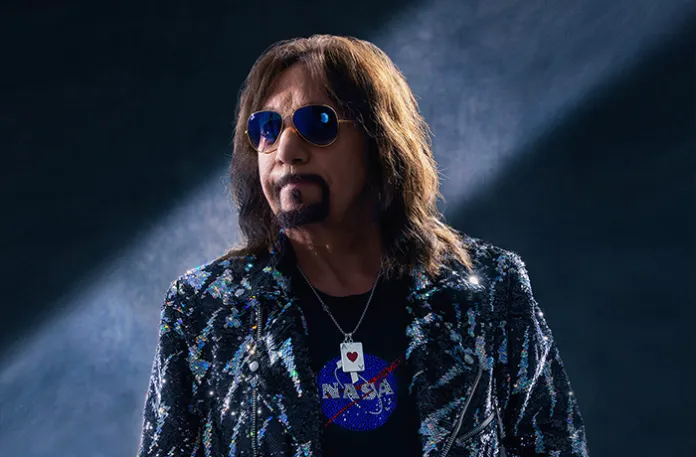If you grew up in the 1970s with a poster of a band that looked like they’d just stepped off a UFO — faces smeared in greasepaint, outfits stitched from leather and lightning bolts, guitars that belched smoke like malfunctioning rockets — you probably owe a chunk of your teenage rebellion to Ace Frehley. Not Gene Simmons with his fire-breathing bass or Paul Stanley’s starstruck strut, but Frehley, the silver-eyed Spaceman whose riffs sliced through the chaos like a laser beam from a B-movie spaceship. As he once put it in a rare moment of cosmic understatement, “I’m just a kid from the Bronx who got lucky.” Lucky? Tell that to the millions who picked up a guitar because Ace made it look like the coolest way to thumb your nose at the universe.
Paul Daniel Frehley, who died on Oct. 16 in Morristown, New Jersey, at 74, wasn’t born to conquer arenas. He arrived on April 27, 1951, in a gritty corner of the Bronx. At 13, hooked by the British Invasion, the Beatles and the Rolling Stones, he scored a Gibson Melody Maker for Christmas. It ignited him. By high school, he was jamming in scrappy cover bands, earning the nickname “Ace” for turning awkward hangs into hot dates, as one drummer later quipped.
The late-’60s Bronx forged hustlers and dreamers. Frehley dropped out of school, scraping by as a mail carrier and cabbie while daydreaming of bigger stages. In late 1972, a Village Voice ad announcing that a band was looking for a lead guitarist changed everything: Frehley, 21, auditioned in a Queens loft. The nascent band was comprised of Stanley Eisen (Paul Stanley), Gene Klein (Gene Simmons), and Peter Criscuola (Peter Criss), grinding as Wicked Lester for a sound blending hard rock with comic-book theater. Frehley’s raw, bluesy solos — Jimmy Page meets outer space — sealed it. By January 1973, they were Kiss.

From the start, Frehley was the secret weapon: the everyman grounding the freak show. He sketched their lightning-bolt logo on a whim, tweaking the double-S into an icon that spawned endless bootleg T-shirts. When they cranked the visuals, face paint as armor, costumes as exoskeletons, Frehley went full sci-fi: silver stars around his eyes, a shimmering jumpsuit, and a guitar shooting sparks (and once, real flames that nearly torched the stage). He was Space Ace, crooning “Cold Gin” (his debut tune, belted by Simmons) and “Shock Me,” his gravelly vocals a raw confession from a guy who’d seen too many dawns break over dive bars.
Kiss’s 1974 debut wasn’t exactly a hit with critics — Rolling Stone dubbed it “a joke” — but live shows were carnivals on steroids. Pyrotechnics singed eyebrows, Simmons spat fake blood, and Stanley mooned crowds from 20-foot platforms. Frehley staggered through solos, his cigarette dangling and his Les Paul wailing like a siren from the stars. Alive! in 1975, from Detroit’s Cobo Hall, made them a religion. “Rock and Roll All Nite,” with Frehley’s hooky riff, became the creed fans chanted back like a battle cry.
The ascent was meteoric. Albums piled up: Hotter than Hell (1974), Dressed to Kill (1975), Destroyer in 1976 with its orchestral bombast; each a step toward multiplex-sized ego. Frehley penned sleazy gems such as “Parasite” and “Strange Ways,” slithering with an edge the others couldn’t touch. Offstage, he was the wildcard, wisecracking over rehearsing. The 1978 solo album frenzy saw his shine: “New York Groove” hit No. 13, a disco-funk love letter to his roots with Nile Rodgers’ groove. It’s such a feel-good tune that to this day, New York’s Citi Field plays it after every Mets win, rare as those can be.
But Kiss was a pressure cooker. Simmons and Stanley’s control-freak natures clashed with Frehley and Criss’s free-spirited inclinations. By 1982, after uncredited work on Creatures of the Night, Frehley bolted. “It became a chain around my neck,” he griped. Free, he launched Frehley’s Comet in 1984. The 1987 debut went gold, with hooks such as “Rock Soldiers” (a nod to his wilder nights) and “Into the Night” burning bright. Tours with Alice Cooper followed, but grunge fizzled it out by the early ’90s.
Frehley orbited solo, putting out Trouble Walkin’ in 1989. He reunited with Kiss in 1996, but by 2002, the group had fractured once more.
MAGAZINE: AMERICAN JEWS FEEL JOY THAT COMES WITH SURVIVING HOSTAGES’ FREEDOM
Frehley’s legacy can be felt in every child in their garage trying to ape his “monster plod.” Tom Morello called him his first hero, and Eddie Van Halen envied his tone. The Rock & Roll Hall of Fame inducted him in 2014.
Ace piloted rock through asteroid fields that most wouldn’t dare. He leaves scorched amps, sold-out nights, and one-liners for memoirs. He lived and played the way he wanted to, without caring too much about what the naysayers thought. As he once said, “Anybody who says anything bad about me is foolish, because a lot of people like me.”
Daniel Ross Goodman is a Washington Examiner contributing writer and the Allen and Joan Bildner Visiting Scholar at Rutgers University. Find him on X @DanRossGoodman.
